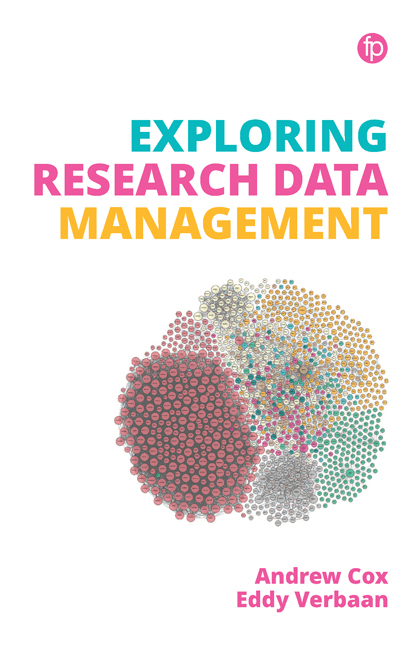Book contents
- Frontmatter
- Contents
- List of tables and figures
- 1 Introducing Research Data Management
- 2 The Social Worlds of Research
- 3 What Are Research Data?
- 4 Case Study of RDM in an Environmental Engineering Science Project
- 5 RDM: Drivers and Barriers
- 6 RDM as a Wicked Challenge
- 7 Research Data Services
- 8 Staffing a Research Data Service
- 9 Requirements Gathering for a Research Data Service
- 10 Institutional Policy and the Business Case for Research Data Services
- 11 Support and Advice for RDM
- 12 Practical Data Management
- 13 Data Management Planning
- 14 Advocacy for Data Management and Sharing
- 15 Training Researchers and Data Literacy
- 16 Infrastructure for Research Data Storage and Preservation
- 17 Evaluation of RDS
- 18 Ethics and Research Data Services
- 19 A Day in the Life Working in an RDS
- 20 Conclusion: the Skills and Mindset to Succeed in RDM
- Index
10 - Institutional Policy and the Business Case for Research Data Services
Published online by Cambridge University Press: 21 September 2019
- Frontmatter
- Contents
- List of tables and figures
- 1 Introducing Research Data Management
- 2 The Social Worlds of Research
- 3 What Are Research Data?
- 4 Case Study of RDM in an Environmental Engineering Science Project
- 5 RDM: Drivers and Barriers
- 6 RDM as a Wicked Challenge
- 7 Research Data Services
- 8 Staffing a Research Data Service
- 9 Requirements Gathering for a Research Data Service
- 10 Institutional Policy and the Business Case for Research Data Services
- 11 Support and Advice for RDM
- 12 Practical Data Management
- 13 Data Management Planning
- 14 Advocacy for Data Management and Sharing
- 15 Training Researchers and Data Literacy
- 16 Infrastructure for Research Data Storage and Preservation
- 17 Evaluation of RDS
- 18 Ethics and Research Data Services
- 19 A Day in the Life Working in an RDS
- 20 Conclusion: the Skills and Mindset to Succeed in RDM
- Index
Summary
Aims
The aim of this chapter is to discuss aspects of developing and using an RDM policy.
Writing a policy
A policy is a written statement of general principles that guides activities and decision making on a particular issue across an organisation. Going through the process of bringing together key stakeholders (or their representatives) to agree on a common stance lays the essential foundation for a co-ordinated response to an issue. The very process of agreeing a policy helps solidify the issue, co-ordinate views on how it should be understood and clarify the stance of the institution.
Having the written policy in place motivates and aligns action, and reduces misunderstanding. At its heart is a definition of roles and responsibilities for key stakeholders. It is the mandate for any services the institution offers.
Developing a policy
An internal policy discussion to make a policy establishes that RDM is a recognised concern for the institution. Indeed, simply establishing that there is a need for a policy may be the first battle. As we saw in Chapter 6, some responses to a wicked challenge could be that ‘there is no issue’ or that ‘it is adequately covered by existing policy or good practice’. Bringing key stakeholders together at a high level enables the institution to understand the full ramifications of the issue.
Because RDM touches on researchers at different levels and a number of professional support services there is a particular need to clarify roles.
It might be that writing the policy is the first action of an institution to respond to RDM; but it might be that pilot services need to be developed to prove the nature of the need.
Researching the policy is likely to involve data gathering in six areas:
1 The wider trends in the sector around RDM, e.g. why it has become a key issue.
2 More specifically, the wider policy context: what are the key current policies from governments, relevant funders and so on, with which local policy must align? What are the relevant legal reference points, e.g. in relation to data protection or copyright?
3 The state of play within the institution, to scope out the nature of the challenge, and to identify existing activities and resources.
- Type
- Chapter
- Information
- Exploring Research Data Management , pp. 95 - 100Publisher: FacetPrint publication year: 2018



